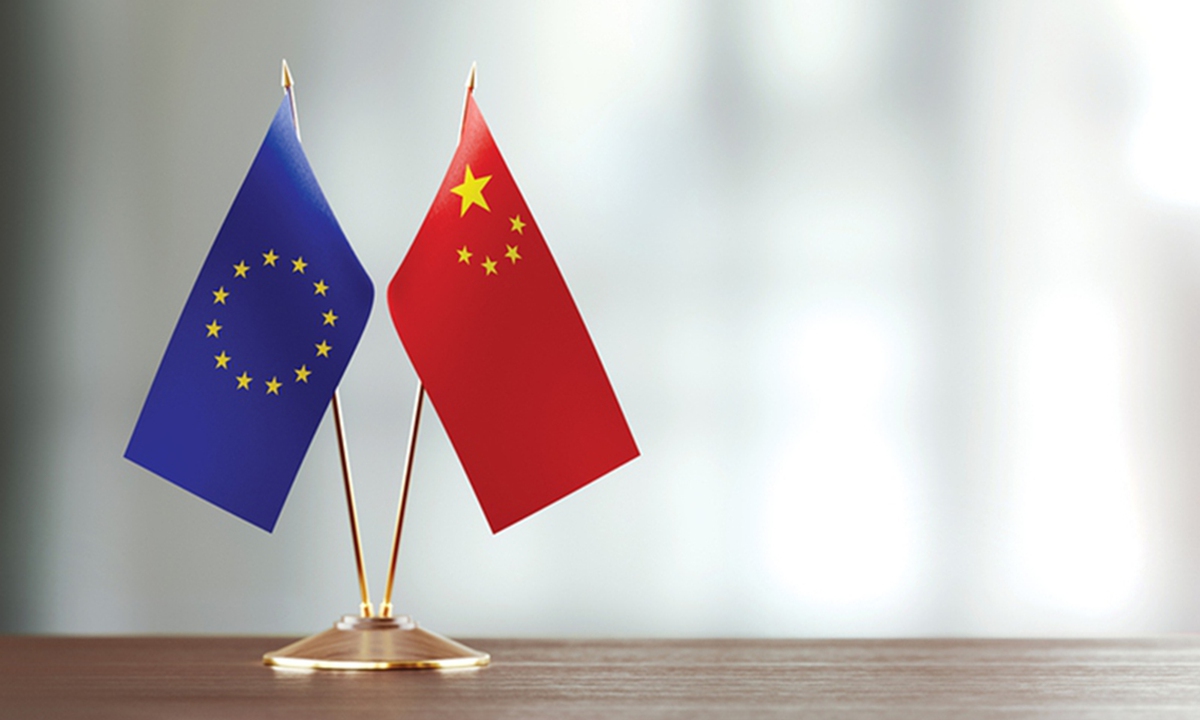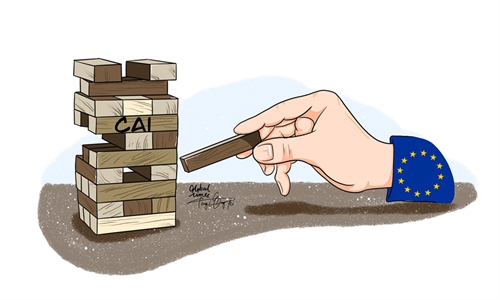European Parliament votes through motion to freeze China investment deal, risking bloc’s economy amid political self-entertainment
Investment deal hanging in air with unfreezing expected

China EU Photo: VCG
The European Parliament voted through a motion on Thursday to freeze the China-EU Comprehensive Agreement on Investment (CAI), putting the brakes on ratifying the massive deal that is envisioned to assist the 27-nation bloc's economic recovery amid lingering COVID-19 woes.With the latest motion leaving the deal hanging up in the air, the European Parliament has apparently put its groundless and politically motivated provocations against China above the bloc's economic fate that is intimately tied to its financial and trade partnerships with China, observers said.
They also urged the EU to abandon political coercion as it won't intimidate China but may put the bloc's true interests at stake.
European Parliament decided to freeze ratification talks for the CAI. The agreement has "justifiably been frozen" because of the Chinese sanctions (which are countermeasures to European sanctions on China over Xinjiang-related affairs), according to a statement the European Parliament press office sent to the Global Times late on Thursday.
Zhao Lijian, spokesperson of the Chinese Foreign Ministry, said at Wednesday's routine media briefing that China's countermeasures are necessary and a response to the EU's sanctions against China. He urged the EU to reflect on this, enhance mutual understanding through dialogue and communication, and properly manage differences.
The discussion is a move "harming others without benefiting themselves," Cui Hongjian, director of the Department of European Studies at the China Institute of International Studies, told the Global Times on Thursday.
China's sanctions against the EU over human rights issues were beyond the EU's expectations and that they had actual effects on the EU. "The European Parliament had no other way, so they "kidnapped" the investment agreement talks to threaten China to lift sanctions, Cui said
"Freezing the deal isn't tantamount to annulling the CAI, which is still in the process of being ratified," He Weiwen, a former senior Chinese trade official, told the Global Times on Thursday.
The motion to put the CAI on hold is destined to be followed by moves to unfreeze the deal, although it's hard to tell how many such zigzags it might have to go through, He said.
The CAI has not been finalized in a legal form, European Parliament press officer Natalie Kontoulis told the Global Times on Wednesday via email.
"On the EU-China investment agreement, there is a political agreement which is not yet confirmed by neither the member states nor the Parliament," Kontoulis said.
China and the EU concluded seven-year negotiations over the CAI at the end of 2020 and the EU has said it wants the ratification process to be completed by 2022.
The EU's indulgence in ideological prejudice and political leverage that sees the European Parliament canceling a meeting in late March for CAI discussion amid an exchange of Chinese countermeasures and EU sanctions apparently set blockades over the course of signing the deal into law.
The results from Thursday's vote were yet another baffle to subject the investment deal to certain European Parliament members' preposterous motions using groundless human rights claims as an excuse to block progress on the deal that bodes well for European businesses and consumers, He remarked. He said that the EU would benefit more from the deal than China as European businesses are granted greater access to the Chinese market.
The results of the vote mask divergences within the bloc regarding the conflicting choices between maximizing economic interests and taking an hard-line ideological stance toward China, Dong Chengxi, a research fellow with Shanghai-based Zhixin Investment Research Institute, told the Global Times on Thursday.
Especially for the member states that are economically closer to China, the political farces would by no means become insurmountable obstacles over the course of their pursuit of stronger economic partnerships, according to Dong, a regional affairs observer.
Given the split of opinions within the bloc, Chinese experts thought the freezing will not be accepted by other EU agencies and member states.
"Now it is time for the EU to figure out what is really of benefit to them, as they face an urgent need to resume the economy after the pandemic," Cui noted.
The EU is at a critical stage of its economic recovery, with financial stability at risk from high levels of financial leverage, thereby rendering it increasingly important to ensure even closer ties with China, rather than moves in the opposite direction, analysts said.
For one thing, US inflation woes are seen fueling rate hike bets, roiling the equity market and accordingly putting pressure on Europe to ditch dollar assets in favor of yuan-denominated assets as safe havens, Dong remarked.
US inflation surged to 4.2 percent in the 12 months through to April, its highest since 2008, official data showed.
Minutes from the Federal Reserve's recent meeting showed Wednesday that the US is on its way to meeting the US central bank's test to cut back bond buying.
Also, the EU continues its reliance on trade with China to bolster its economy from the COVID-19 fallout, Dong mentioned.
From January to April, China's exports to the EU, the country's second-largest trading partner after the ASEAN, soared 36.1 percent in yuan terms, while its imports from the bloc jumped 26.4 percent, Chinese customs data showed.
Describing Thursday's results as an unnecessary attempt to risk the EU's economic fate, He Weiwen noted that China's trade and investment ties with the continent are still underpinned by various investment treaties China has signed with the 27 member states.
Under no circumstances will China yield to such political coercion, and the bloc risks shooting itself in the foot if the massive deal is aborted, observers said.
China has reiterated on many occasions that the China-EU investment agreement is a balanced and win-win agreement. It is not a gift from one side to the other and it serves the interests of both sides.
Chinese analysts noted that the motion was probably a result of the EU being pressured by the US and the maladaptation of some EU members after China's countermeasures, with some EU institutions also attempting to use the deal to bargain for a new internal power distribution. But the EU should make it clear that no matter who or what drives them, it is impossible to interfere in China's domestic affairs using any political tactic.

